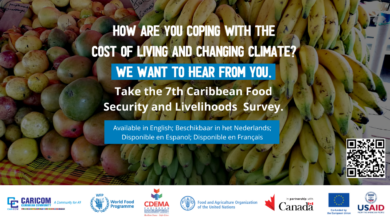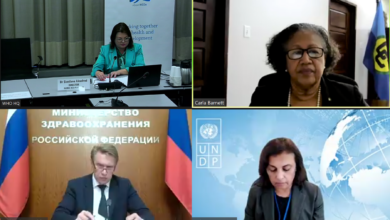|
Prime Minister The Hon Patrick Manning
The Hon John Rahael, Minister of Health Sir George Alleyne, Chancellor of UWI and UN Special Envoy to the Caribbean on HIV/AIDS Members of the Diplomatic Corps Other Officials Ladies and Gentlemen It is my pleasure to bring you greetings on behalf of the CARICOM Secretariat and indeed the entire CARICOM Family. I take this opportunity to offer my sincerest congratulations to Prime Minister Manning for the initiative he took at the Heads of Government meeting in St. Kitts and Nevis in July this year in offering to host a National Consultation and for delivering on that promise. I am sure that without the efforts of the Minister of Health and his staff, this would not have been possible. To Sir George Alleyne, who has been in the vanguard of health promotion in the Region for almost all of his working life, no tribute could be too great. His leadership and commitment are fully demonstrated in the yeoman effort as Chair of the Commission that produced the seminal Report on Health and Development in the Caribbean, and the follow up Report on the Prevention and Control of Non Communicable Diseases. This is a very important consultation for us in the Community, as it deals with some of the most vexing health issues that require our serious and urgent attention. I need not repeat the startling statistics on the non communicable diseases, since these have been well documented in the background papers prepared for this consultation. For me, among the most significant of the findings resulting from this body of work, are the economic implications of the escalating prevalence rates of diabetes, hypertension and obesity. It is important that we find the formula to prevent and control these diseases, because they can be prevented by and large, and they definitely can be controlled. The essential questions however are: what polices do we need to pursue urgently? Who are to be involved? And what are the costs? I expect that your deliberations would help us to find the answers. But beyond these issues is the need to explore how, as a Region, we could collaborate meaningfully in prevention and control. How, as a group of countries that is enjoined in the enterprise of a CSME, do we embark on policies for sharing services and resources and on functional cooperation? Within the Caribbean Community, we have the mechanism to pursue these policies and programmes at the regional level. As you know, Health and Development falls within the purview of the Directorate of Human and Social Development. In addition, a series of Health institutions have the competences to contribute to the research and practice that respond directly to the challenges posed by the NCDs. Chief among these are CAREC, CHRC, CFNI and UWI and the other tertiary level institutions. Of course, the prominent agency for health in the Americas, PAHO, has contributed so much of the technical know how in the past and is the major collaborator with CARICOM in the execution of the Caribbean Cooperation in Health, which is now in its third phase (CCH III). We have demonstrated how, by collaboration, we can achieve success as we did by being the first region to eliminate polio and small pox. The NCD’s are a top priority within CCH III, and we need to use this forum today to help redefine the scope of the agenda that we must pursue over the medium and long run. Hence, I am pleased that the Hon Prime Minister in his intervention on this topic at Heads of Government, in July 2006, conceived of this exercise today as a precursor of a Regional Consultation in 2007 (of course after World Cup Cricket). And I wish to thank him in advance for having Trinidad and Tobago in the forefront of this regional encounter. I also recognize that besides PAHO, we must engage our international partners, not only those in the field of health but those whose core mandates include youth, sport, culture, education , labour. The issues that arise from prevention and control of the NCDs impinge on the lives of workers, youth, students, sports persons and ordinary citizens. We therefore have to come up with a comprehensive strategy, with realistic objectives and a collective will, to win the fight against the NCDs.
In closing, I bring to this consultation the best wishes of the Caribbean Community, firm in the conviction that the Health of the Region is the Wealth of the Region. |
|
|
|
Press Releases






